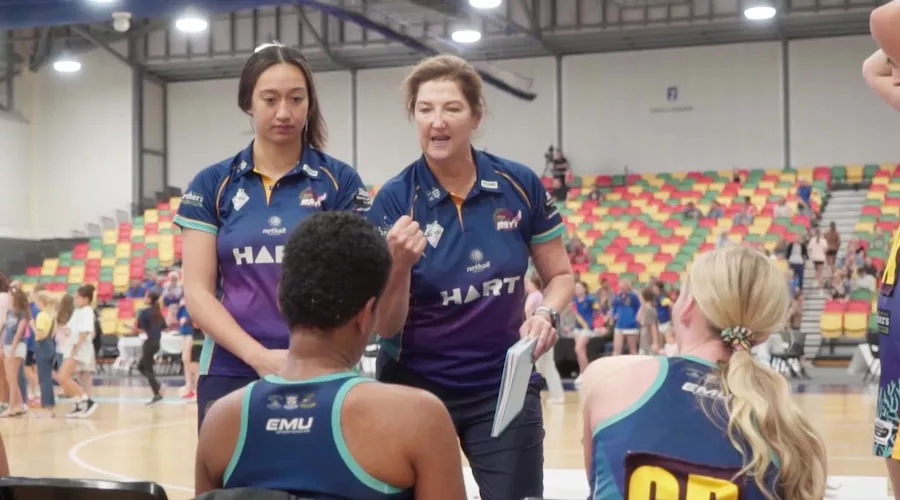By Linda Pearce
The conditioning sessions conducted on a helicopter landing pad, shared with a rugby team and a touch squad, for example, when surrounding areas had flooded. At least the ocean view was as impressive as the cooperation, and both were quite something.
Then there was the lack of indoor practice courts, necessitating the use of one that was a metre short in each third. Which made for some overcrowding though the middle and congested goal circles that, it must be said, suited goal keepers better than most.
Difficulties, too, came when accessing appropriate clothing, including sports bras and socks - any socks, really - and footwear. But no whinges or complaints.
Long walks and waits at bus stops - often during tropical downpours - were required just to be able to attend training and games. Providing there was enough money for the bus fare in the first place, that is.
Yet Wilson, Australia’s fourth most capped player and now an assistant coach with the Sunshine Coast Lightning, also recognises the abundant natural talent in the island nation, and thus understands the importance of the PacificAus Sports Program, which currently involves two of her former charges.
By developing pathways for established athletes to play in high-level Australian competitions, while providing access to high performance coaching and training plus leadership development and educational opportunities, the benefits can extend to the broader Fiji netball program.
The lucky recipients this year: 2019 Netball World Cup teammates Ema Mualuvu, a 21-year-old defender, and Matila Vocea, a 20-year-old goaler and daughter of former Fijian captain Vasiti Vugakoto.
“Fiji are a freckle in the Pacific, they’re such a small nation, and they bat above their weight when it comes to athletes competing all over the world,’’ says Wilson, nominating the famous men’s Rugby Sevens gold medal at the 2016 Rio Olympics as the highlight.
“If you see them in rugby league, and in netball they’ve had some success as well… and it’s so important for the young girls to have incredible role models, and that’s what we want for the Pearls.
“So the more exposure the players have to various training environments and regimes, that can only enhance their status in the netball community. To give them opportunities to train in an elite daily environment is just a wonderful immersion program.’’
Vocea’s tale is both unusual and tragic. She moved to Brussels with her parents and siblings in 2009 when her father Peceli was appointed as Fiji’s Ambassador to Belgium and the European Union, and remained there until the dad-of-five died suddenly in 2014.
By the time the family returned to Fiji, Vocea had learnt multiple languages, but little about the sport her mother Vasiti had played. Despite starting late, she improved quickly, however, helped by maternal guidance, inspiration from the historic fourth-placing at the 2017 World Youth Cup that showed what was possible and guidance, too, from Wilson, on her shooting technique and much else.
“I am extremely humbled to be one of the two selected from Fiji to come and play in the PacificAus Sport program,’’ Vocea says. “After this program I would like to have my knowledge for netball on another level and then I would take that knowledge that I’ve learnt here and share it with my other netball colleagues in Fiji.’’
Longer-term, Suncorp Super Netball is her dream, with Maria Lutua having come closest, as a Lightning training partner in 2017, and circle defender Kelera Nawai this year representing Central Pulse in New Zealand’s ANZ Premiership.
Vocea understands the benefits to be gained from regular high level match play in the Netball Queensland HART Sapphire Series and the daily exposure to an elite training environment. At home, by comparison, 2kg bags of sugar and flour were often used as makeshift weights.
Mualuvu's is a more conventional story, but also one to applaud. Born in Suva, she started playing netball at the age of eight, and in 2019 was selected for the Netball World Cup in Liverpool, where the Pearls finished 14th, and Mualuvu was thrilled to meet the likes of Gretel Bueta and Romelda Aiken.
“I was very happy and so excited for this opportunity to be part of the Northern Mendi Rays team and I was thinking about myself moving to another level, going to another place and meeting new faces and new coaches, learning a bunch of new skills and tactics in regards to the sport of netball,’’ she says.
“I want to be the best netballer on and off the court, so that I can encourage my Fijian players to develop their netball career, and also it will lead to the better local competition and improve or succeed at international level.’’
A more disciplined approach to maintaining possession and limiting contact penalties is one of the keys, according to Wilson, who believes that on top of Nawai competing in the NZ league, there are two others capable of playing SSN.
“Genetically, the Fijians were at the front of the line,’’ she says. “They are very strong. They’ve got so much athletic talent; they’ve got the fast twitch fibres, they’re built, but it’s the motor that they have to develop, because conditioning plays a big role.
"They’re used to hard work, they’re used to walking long distances, but the motor is the hard part; it requires just those repeat efforts, and they don’t have 20 assault bikes or 20 ergs in the gym to take them off their legs. That just isn’t available.
“So it takes opportunity and discipline, and the immersion program is to give the girls the taste of that daily training program and the effort that’s required. So I think it’s exciting for them, and they’re really happy to have a go at it.’
